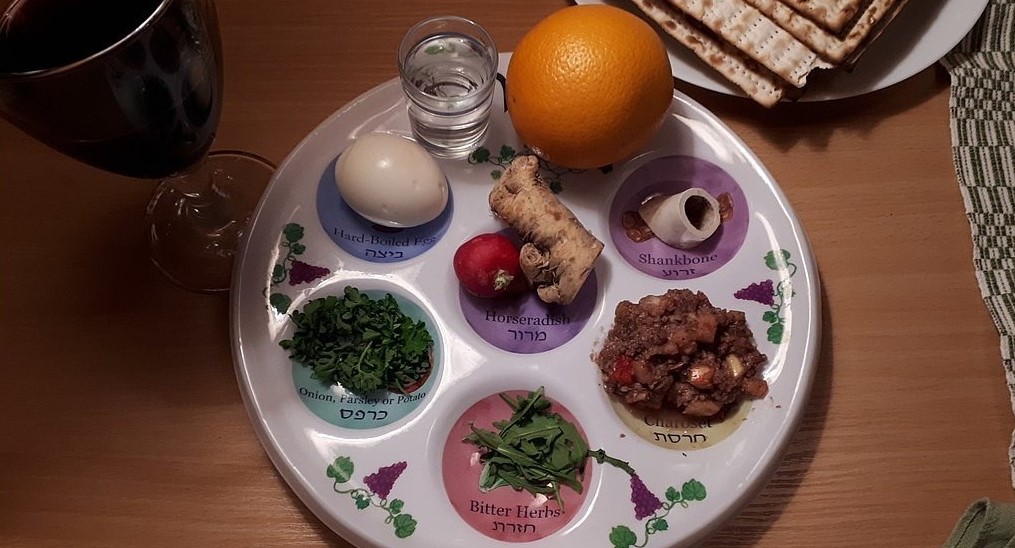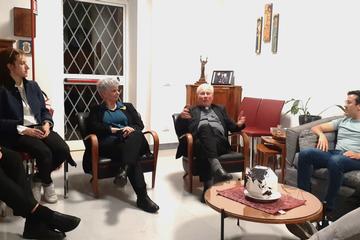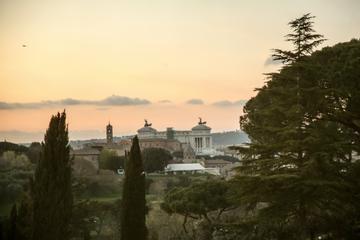
By Dr. Jenn Lindsay
A professor at the University of California Rome Study Center and a Lecturer in Sociology at John Cabot University, Dr. Jenn Lindsay is originally from San Diego (USA). Now based in Rome, she is part of the Rome’s Reformed Jewish Community, Beth Hillel. Here she shares her reflection about the upcoming Passover Seder that she will celebrate in quarantine along with many other Jews around the world.
ROME - This year, for the first year in history, Jewish people around the world are preparing to celebrate their Passover seders online. Usually, a Passover seder features several days of cooking and a deep clean of the house, not only to prepare for many guests but, most importantly, to rid their houses of what Jews call “chametz.”
Chametz are foods with leavening agents that are forbidden on the Jewish holiday of Passover. The word derives from the Hebrew “l’chimutz,” to ferment. Chametz is any food made of grain and water that has been allowed to ferment and rise. That means bread, cereal, cake, cookies, pizza, pasta, and beer. According to Jewish law, Jews may not own, eat or benefitfrom chametz during Passover.
In order to avoid chametz during the Passover season - from April 8 to 16 in 2020 - Jews eat matzah, an unleavened cracker. This is because during the Exodus, when the Jews left Egypt, their freedom granted to them hurriedly by the frightened Egyptians, they had no time to wait for dough to rise. So, they improvised flat cakes without yeast, which could be baked and consumed in haste. Running out of Egypt, technically free, the Jews were still slaves at heart. The matzah reminds us that when the chance for liberation comes, we must seize it, even if we do not feel ready. Indeed, if we wait until we feel fully ready, we may never act at all.
The first two nights of Passover, Jews observe a ritual meal called a “seder.” Seder literally means order, from the Hebrew “l’sader,” to arrange, and there’s a set order to the proceedings. In the same order as they have done for millennia, Jews around the world will gather around the table with each other and they will say a blessing over their wine and wash their hands with a prayer. Then they eat a green vegetable dipped in salt water, the green vegetable representing rebirth, renewal, and growth; the salt water representing the tears of enslavement. After preparing their matzah, Jews recount the Pesach story and contemplate the meaning of freedom. During the telling of the story, they list the 10 plagues that afflicted the Egyptians as part of God’s effort to pressure them to release the Jews to freedom. As they recite each plague, they spill a drop of wine - the symbol of joy - from their cups. Our joy in our liberation will always be tarnished by the pain visited upon the Egyptians.
After this, they taste a bitter herb - usually horseradish - first tasting it alone, then pairing it with “charoset,” a sweet dish made with walnuts and red wine. Why do Jews eat a bitter herb at their seder? It represents the bitterness of bondage. Why do they eat charoset? It symbolizes the mortar for the bricks their ancestors laid in Egypt. Rabbi Rachel Barenblat writes, “Though it represents slave labour, charoset is sweet, reminding us that sometimes constriction or enslavement can be masked in familiar sweetness. Eating the two together, we remind ourselves to be mindful of life with all its sweetness and bitterness, and to seek balance between the two.”
During the seder, Jews will traditionally drink four cups of wine. The first cup of wine reminds us of God’s first declaration: “I will bring you out from the oppression.” The second cup of wine represents God’s second declaration of redemption: “I will free you from slavery.” The third cup of wine represents God’s third declaration of redemption: “I will liberate you with an outstretched arm.” The fourth cup of wine represents God’s fourth declaration of redemption: “I will claim you for me as a people, and I will be your God.”
After the rituals have concluded, Jews sit together and enjoy the Shulkhan Orekh - the festive meal - typically featuring matzoh ball soup and ending with any number of chametz-free desserts, such as flourless chocolate cake. Usually, the meal has been prepared over many days for a large group of people. But this year, quarantined inside for coronavirus, Jews will eat the festive meal only with their family members and roommates. Their contemplations of freedom while mandated to remain inside will seem ironic. Their reflection on plagues will seem more bitter than the bitter herb.
Chametz means more than just leavening for bread. Some Jews connect chametz to a puffiness of self, an inflated personality, an egocentricity that can eclipse the higher values of the individual. Year after year, we build up our egos and material investments, until this season when we are commanded to set them aside and free ourselves of our worldly burdens. Year after year, our chametz must be ritually removed. Every year, we must return to the roots of freedom because we have managed to enslave ourselves anew every year.
Chametz is also the baggage we carry from broken promises, failed relationships, and personal disappointments that weigh heavily on us. It is the refuse of daily life - the residue of poor decisions, mistakes in judgment, and moral failure. What do we do with this kind of chametz? The Passover seder ritual and the days beforehand spent cleaning out chametz from the cupboards of the house symbolize spiritual house-cleaning: the opportunity to discard the puffery of ego. What, in yourself, do you want to cast away this Pesach?
During the seder, Jews sing the song “Dayenu,” which means, “It would have been enough.” It would have been enough to be born - but look! We also got to live in a world with puppies, friends, sunshine, and music. It would have been enough to wait out the quarantine in silence, but instead we found the energy to play music from our balconies and coordinate Passover seders with friends and family from around the world through the internet. Dayenu means to celebrate each step toward freedom as if it were enough, then to start out on the next step. It means that if we reject each step because it is not the whole liberation, we will never be able to achieve the whole liberation.
Jews are commanded to celebrate as if each one of us were personally liberated from Egypt. This is especially poignant in 2020, as we are confined to our homes worldwide due to the COVID-19 pandemic. Freedom means something different this year. The plague is no longer a relic of an ancient story: it is on our doorsteps, killing tens of thousands of people across many countries. As Jews contemplate the destruction of the plagues in the Passover story, we realize that we are not only the Jews in the story, fleeing toward freedom. This year, we are also the Egyptians, plagued not only by coronavirus but by the broken healthcare systems and economies in its wake.
For the Passover dinner, a cup of wine is set for the prophet Elijah. In the Bible, Elijah is a Middle Eastern farmer who challenged the ruling elite. According to Rabbi Rachel Barenblat, “Elijah declared that he would return once each generation in the guise of someone poor or oppressed, coming to people’s doors to see how he would be treated. Thus, would he know whether or not humanity had become ready to participate in the dawn of the Messianic age. He is said to visit every seder, and sip there from his cup of wine.”
During the seder, Jews open the door to welcome Elijah. This year, when Jews contemplate how they hope to bring themselves closer to freedom, they will open their doors and windows to the prophet Elijah, contemplating a day when the plague of COVID-19 has passed and we can exit our homes freely, move about our cities freely, embrace each other freely.
Freedom is the cornerstone of Judaism. But freedom unchecked devolves into chaos. It is the order of the seder that unbinds true freedom and steadies it through tradition and structure, granting us agency to make the most of this quarantine season. The steadying hand of our traditions reminds us that only free people can choose to celebrate and to live according to higher values and the most life-giving aspects of human existence, even in quarantine. In this Passover season may we cast out the chametz of fear and grief, if only for a few days, and reconnect to the thousand freedoms we can enjoy every hour, even in the midst of a plague.
Photo: Passover Seder plate. (Photo by Mikael Haggstrom/Creative Commons CCO 1.0 Universal Public Domain Dedication)


